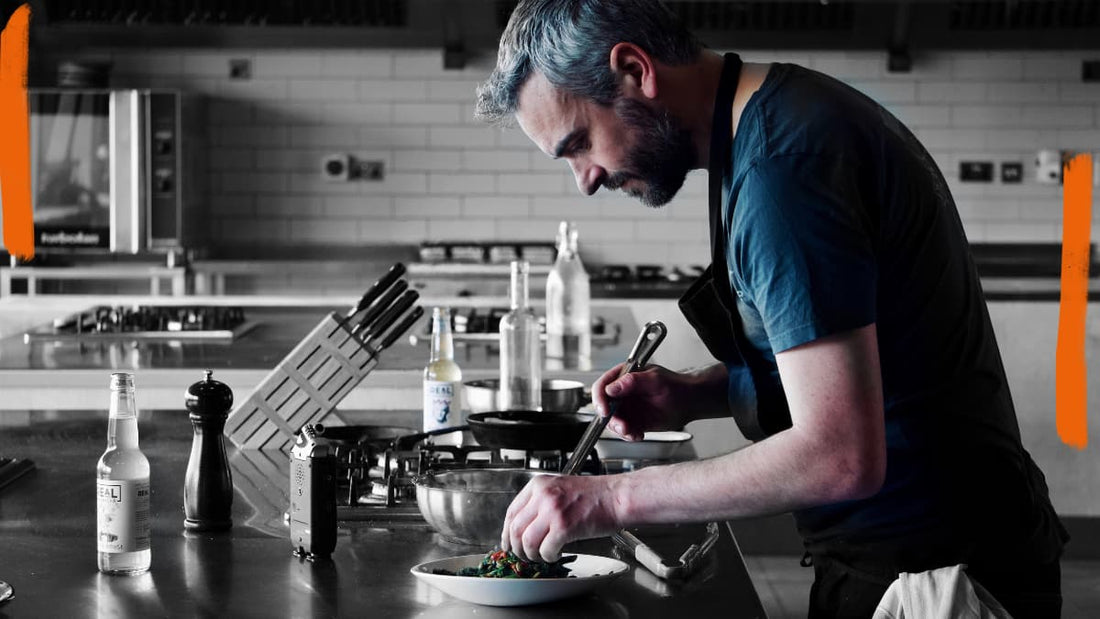 It's been a fascinating month here on the Real Kombucha blog. We've met with and chatted to some really forward-thinking people on our Real Podcast, with our focus on sustainability all the way.To round the month off, we thought we'd take a look at five restaurants in the UK that are really doing things to make sustainable, significant change.
It's been a fascinating month here on the Real Kombucha blog. We've met with and chatted to some really forward-thinking people on our Real Podcast, with our focus on sustainability all the way.To round the month off, we thought we'd take a look at five restaurants in the UK that are really doing things to make sustainable, significant change.
Before we dig in, however, huge thanks to Amelia at Foodchain. At the heart of what we do on our podcast and our blog is a sense of real community. Whether we're examining the way in which we approach alcohol as a society, or the way in which the world of food and drink must adapt to our planet's ever-changing needs, none of this comes about without knowledge sharing and dialogue. Not only was Amelia a wonderful interviewee, she also introduced us to some fascinating people. Big love, Amelia!
Without further ado, though...
Silo
https://www.youtube.com/watch?v=LwHut5N7Rr0
The restaurant/chef that is on everyone's lips right now is Silo and Douglas McMaster. Starting out on Upper Gardner Street in Brighton, "the restaurant that has no bin" is soon set to move to Crate Brewery in Hackney Wick. McMaster's five-year stay on the South coast was not without controversy (“Brighton is not the town for such a forward-thinking restaurant”), but there can be no doubt that his work has caught the eye.
During our podcast interviews this month, every single interviewee named him as this generation's most influential chef, with his book (Silo: The Zero Waste Blueprint) sat firmly on most of their shelves. And he's only just beginning. His move to London will be watched with scrutiny. How do you create a zero-waste restaurant in the middle of one of the world's biggest cities? Just ask the McMaster.
Tredwells
Actually, if Douglas McMaster is looking for tips on that last point, he could drop by Tredwells and see how Chantelle Nicholson is already making headway. We met with Chantelle for a podcast interview earlier this month (click the podcast player above to listen in), and we found her views on sustainability in restaurant industry inspiring, to say the least.
In fact, her work in the sustainable restaurants sector is so full-on, it's a wonder she has time to run a restaurant at all. Aside from authoring Planted, she's also the brains behind Chef Manifesto, a collective ensuring that a sustainable agenda is recognised by chefs worldwide.
But Tredwell's is a sustainable institution in and of itself. "Rooted in London, globally inspired", Chantelle's menus are informed by a childhood growing up in New Zealand with constant access to fresh, local ingredients. There's something ever so slightly oxymoronic about the idea of finding fresh, seasonal ingredients in the ancient concrete jungle around London's Seven Dials, but this wonderfully passionate chef enjoys the challenge and makes it happen at world-beating standards.
Social Pantry
https://www.instagram.com/p/BR_VAHFBSjt/
Our world spins past us at light speed, so it can be easy to fall into the trap of thinking that sustainable practices start and stop with buzzwords. While we're all currently focused on zero waste and a reduction of plastics, the wonderful Alex Head has concentrated on people.
Social Pantry is an amalgamation of foodie goodness. They have their own catering company. They have two restaurants and a growing collection of cafes – read all about them here). However, what marks them out is the work that they do with young offenders.
Linking with Key4Life, Redemption Roasters, Bad Boys Bakery and Switchback, Alex says that Social Pantry aims to employ 10% of its workforce through young offenders rehabilitation schemes. The idea is to help incarcerated people, determined to turn things around, by assisting their training while they're still inside and ensuring that they'll have a way of earning a living once they are released.
You can see what they're doing first-hand over a seasonal meal at either Crane's Kitchen (Peckham), Soane's Kitchen (Ealing) or the Social Pantry Cafe (Lavender Hill). We really love what they're up to.
SixSeats
A trip to SixSeats in Kent, run by former Nordic Food Lab man, Tobyn Excell, sustains on many levels. Much of what Chef Tobyn prepares for you has been foraged from within 100 metres of his kitchen. You know this to be true because you've foraged it with him earlier in the afternoon. He adapts recipes from 15th century monasteries and abbeys, largely because modern cookbooks no longer tend to use the hogweed, lady smock and wood sorrel that grow in the woodland around us.
This is sustainable cooking at a hyper-local level – wifi off, conversation to the fore. You're sat around a table with only five other people, chef and sommelier busy by your side, and the food is the social glue in the evening's proceedings. It's wonderful soul nourishment, offering a personal sense of sustainability: a way to recharge from all the digital, political noise that we're bombarded with on a daily basis. We can't recommend it highly enough.
If you're particularly eager to go off-grid, you can book in for the night and stay in the guest rooms. Note that it's currently a monthly pop-up, run by Tobyn's Sæl Projects. For more info, have a listen to our podcast above or read our article here.
River Cottage

Sure, Hugh Fearnley-Whittingstall's River Cottage is well-known to most of us, but that doesn't make it any the less relevant. For 20 years they've been at the forefront of sustainable living, pushing the industry (and thanks to Hugh's TV programmes, the public at large) to rethink how it does things.
If you want to see how a foodie business draws a line in the sand and sticks to its guns, head down to River Cottage HQ in Devon for one of their many classes. Or if you're not feeling quite so political, simply turn up to one of their national restaurants and try farm-to-table cooking at its best. Alternatively, you can begin by checking out our interview with River Cottage's Gelf Alderson here.
Once you've realised the possibilities, it's really hard to turn back.

